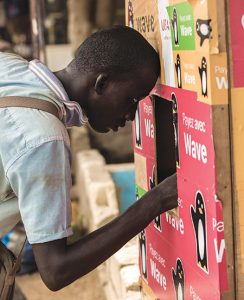Bloomberg
Mobile money agents in Ivory Coast halted service for Wave Mobile Money Inc few weeks ago, in an attempt to stymie the growth of the young fintech gobbling up market share across West Africa.
The agents — brokers who enable unbanked people to store and send money through cellphones — were unhappy with their commissions and expected the suspension to severely cripple the company’s business. Instead, Wave had one of its best weeks since launching three years ago in West Africa’s third-biggest economy. “Transactions spiked for a couple of hours,†said Katier Bamba, the company’s general manager for Ivory Coast.
The money transfer app came out unscathed because, unlike telecommunications companies which use intermediaries to manage agents, Wave maintains direct relationships with individual agents. That allowed it to keep doing business as usual.
It wasn’t the first time that the five-year-old fintech has upended the industry. When Wave first launched in Senegal in 2018, it took on the local unit
of French telecommunications giant Orange SA, forcing the latter to cut prices to compete.
Now, with a new e-money license at its disposal, Wave is expanding its services, becoming the first non-telco, non-bank with the ability to facilitate small-and-medium sized lending, and to issue micro-credit and virtual credit cards in eight countries in Francophone West Africa independent of a financial institution.
With this, the region’s already fierce mobile money wars are heating up.
None of this would be possible without M-Pesa, the original mobile transfer operator. Launched in Kenya in 2007, the Safaricom Plc product is how people across the continent
do business. But in contrast to East Africa, where M-Pesa revolutionised the market, West Africa was until recently far less competitive. Wave spotted an opportunity.
In Senegal, Wave’s primary market, only 17% of people have a bank account, but nearly half of adults use mobile money services. In West Africa, mobile money usage saw a 60% increase over the previous year, hitting $239.3 billion in transactions. But with more players competing, the market is getting tighter.
A showcase for this is Dakar’s downtown commercial district, where colourful stickers for mobile money companies reflect changes in the national market. There’s the red-and-white logo for YUP, the Société Générale SA app that cancelled its service earlier this year.
 The Gulf Time Newspaper One of the finest business newspapers in the UAE brought to you by our professional writers and editors.
The Gulf Time Newspaper One of the finest business newspapers in the UAE brought to you by our professional writers and editors.
